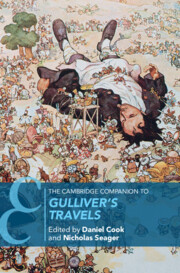Book contents
- The Cambridge Companion to Gulliver’s Travels
- The Cambridge Companion to Gulliver’s Travels
- Copyright page
- Contents
- Figures
- Notes on Contributors
- Abbreviations
- Note on the Text
- Chronology
- Introduction
- Part I Contexts
- Part II Genres
- Chapter 5 Popular Fiction
- Chapter 6 Satire
- Chapter 7 Travel Writing
- Chapter 8 Philosophical Tale
- Part III Reading Gulliver’s Travels
- Part IV Afterlives
- Further Reading
- Index
- Cambridge Companions to Literature
Chapter 6 - Satire
from Part II - Genres
Published online by Cambridge University Press: 05 October 2023
- The Cambridge Companion to Gulliver’s Travels
- The Cambridge Companion to Gulliver’s Travels
- Copyright page
- Contents
- Figures
- Notes on Contributors
- Abbreviations
- Note on the Text
- Chronology
- Introduction
- Part I Contexts
- Part II Genres
- Chapter 5 Popular Fiction
- Chapter 6 Satire
- Chapter 7 Travel Writing
- Chapter 8 Philosophical Tale
- Part III Reading Gulliver’s Travels
- Part IV Afterlives
- Further Reading
- Index
- Cambridge Companions to Literature
Summary
The chapter reviews literary contexts for Gulliver’s Travels, surveying relevant earlier texts, and indicating their satiric influence. With little reference to major verse satirists of Greece and Rome, key works include fictional narratives such as the Golden Ass of Apuleius, and most significantly the True Histories of Lucan, and his widely copied Dialogues of the Dead. In the Renaissance, we find specific links with More’s Utopia and a general debt to Erasmus’s Praise of Folly. An imaginary voyage in space available to Swift is Cyrano de Bergerac’s States and Empires of the Moon. The biggest single influence comes from the twin stories of Rabelais, Gargantua and Pantagruel. More modern writers whose practice was known to Swift are seventeenth-century English poets, headed by Dryden, Marvell, Butler, and Rochester. Contemporaries who produced effective satires in prose were Tom Brown, Ned Ward, and William King. The author’s friends in the Scriblerus group, Pope, Arbuthnot, and Gay, naturally left some mark on Gulliver. Overall, the satiric workings of Swift’s masterpiece show abundant traces of these traditions, but its success owes most to his own comic gifts, learning, and capacity at once to attract and disturb the reader.
- Type
- Chapter
- Information
- The Cambridge Companion to Gulliver's Travels , pp. 73 - 84Publisher: Cambridge University PressPrint publication year: 2023

